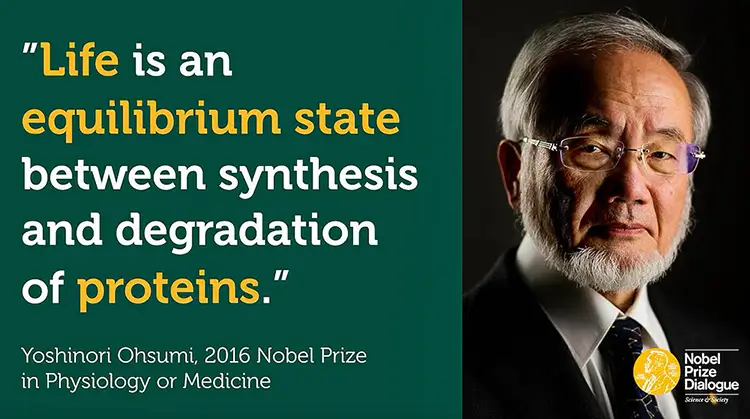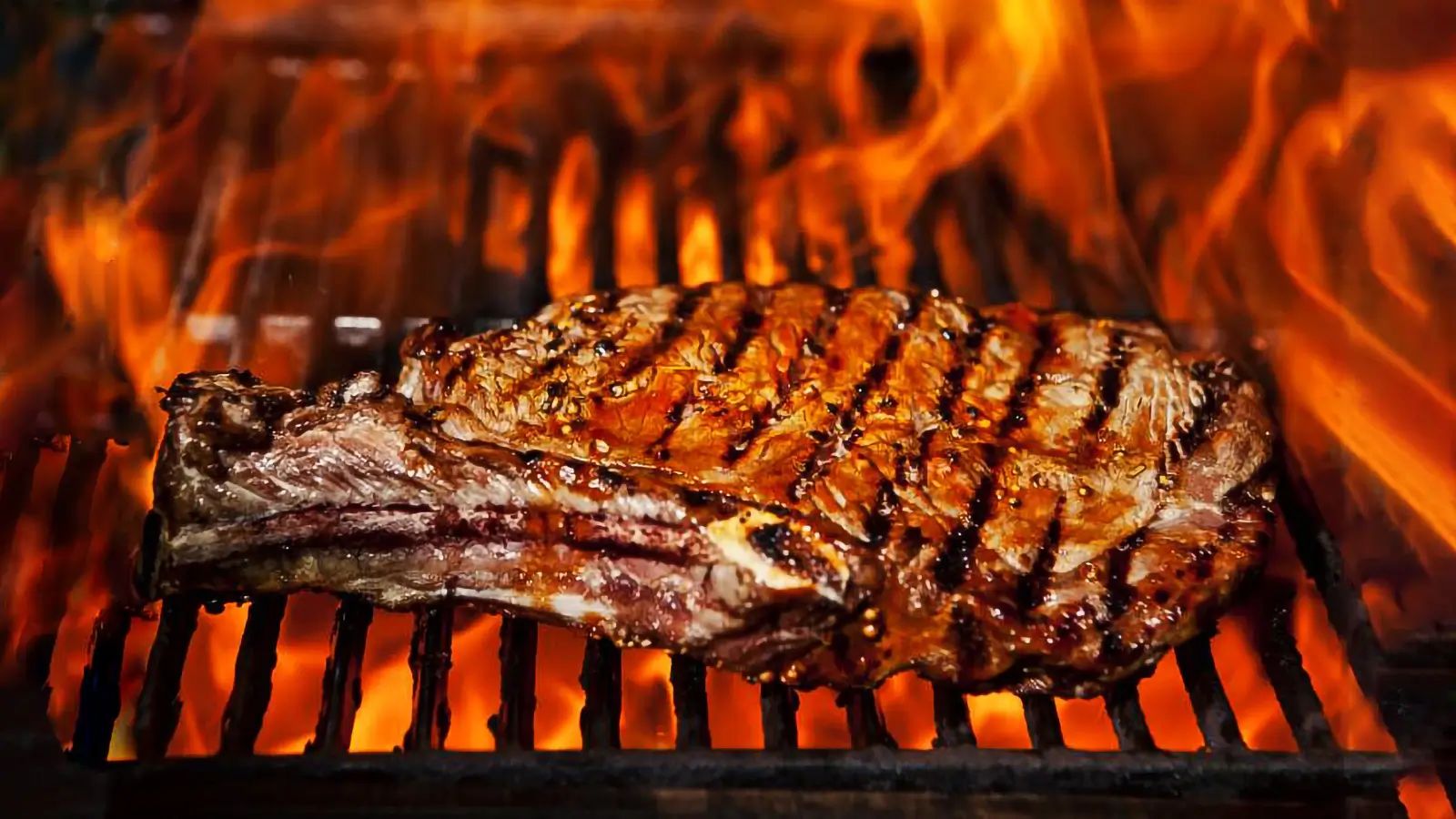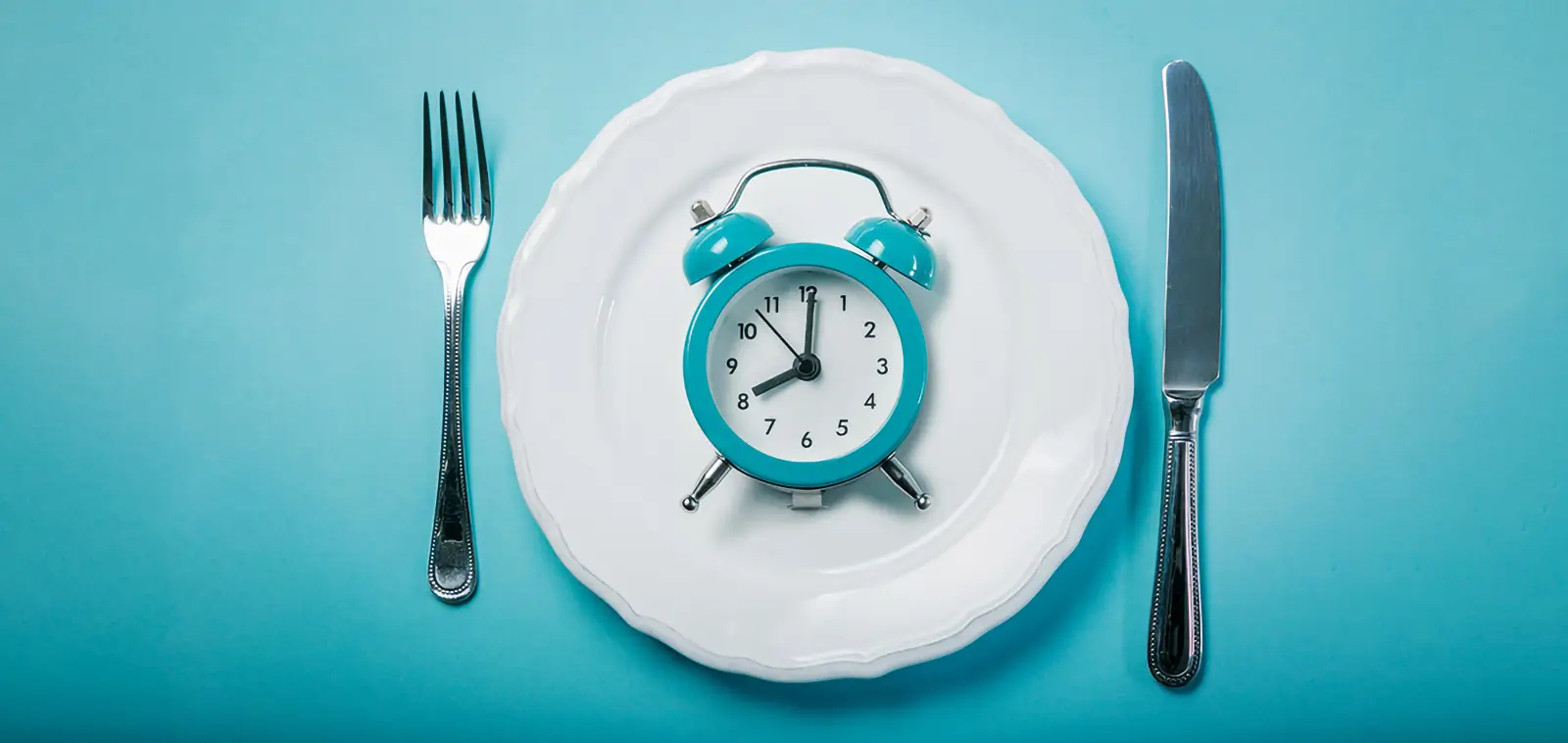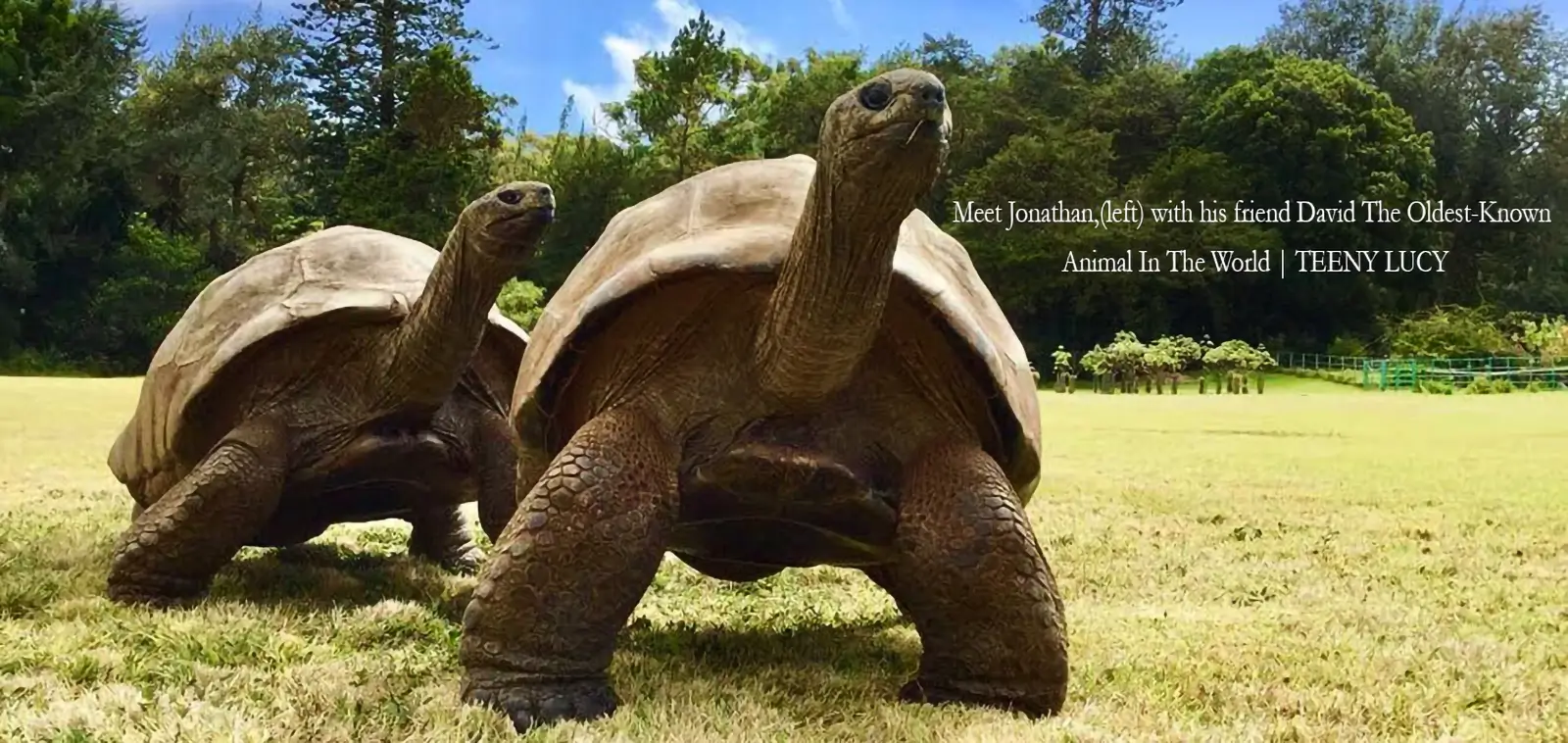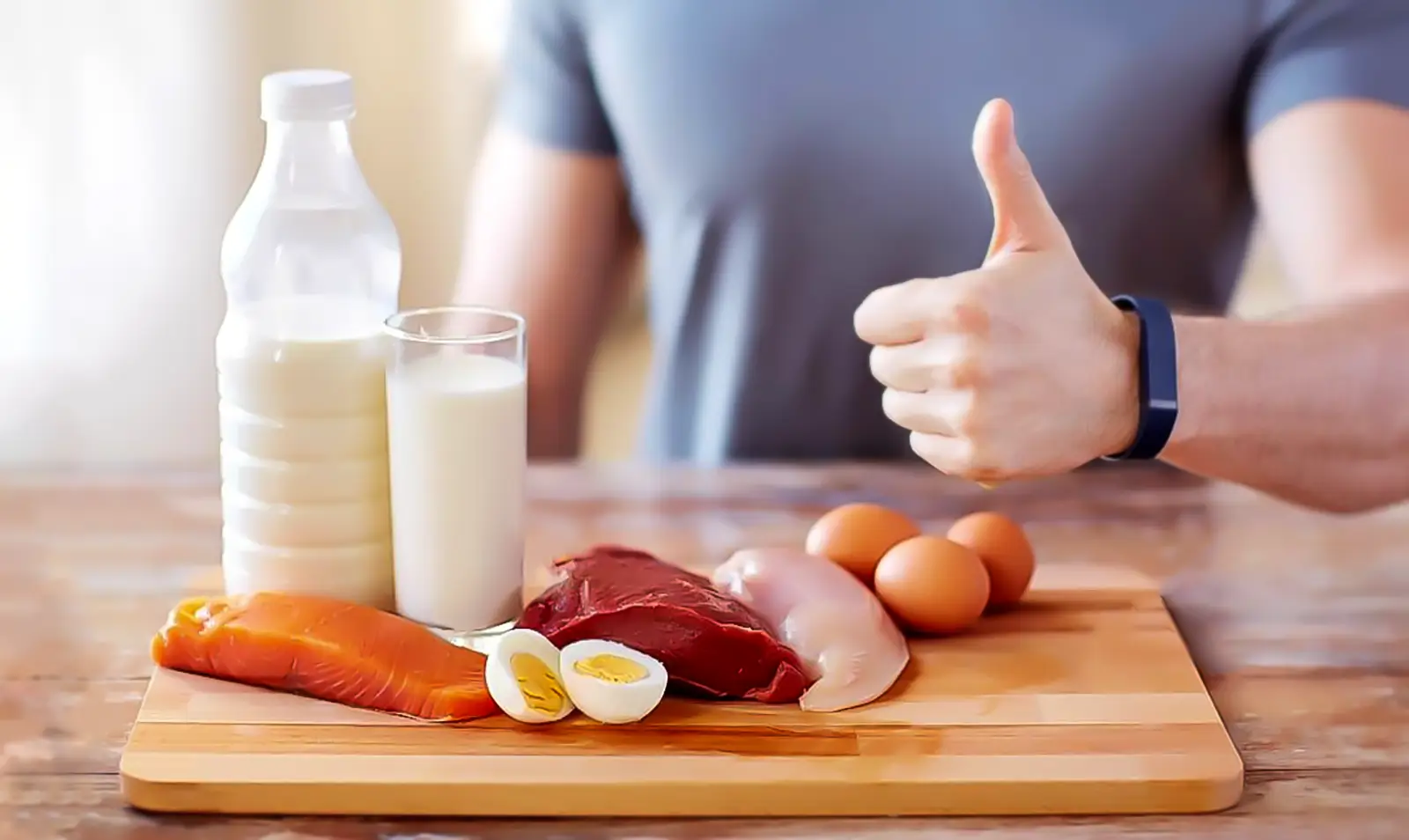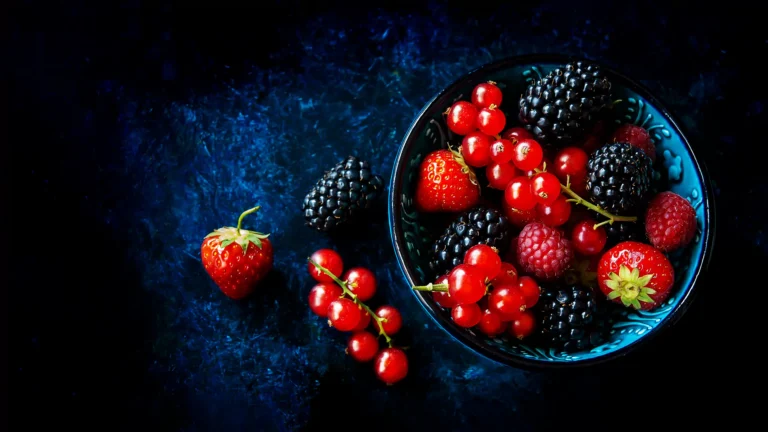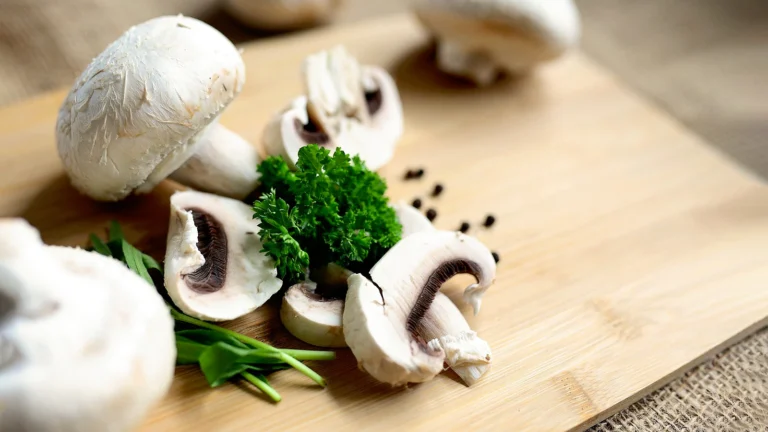Calorie restriction, Autophagy, Longevity, and Muscle loss
We all want a substantial amount of muscle mass and fast metabolism so that we can eat more but autophagy is what is in line with evolutionary biology.
Milos Pokimica
Written By: Milos Pokimica
Medically Reviewed by: Dr. Xiùying Wáng, M.D.
Updated June 9, 2023We want to have muscle mass as much as possible and a fast metabolism as much as we can so that we can eat more and don’t gain weight but evolutionary biology will again tell us what is healthy and it is not constant overeating on food. Animals in nature have a hard time finding food so a basic level of existence is an increased level of autophagy with intermittent fasting and calorie restriction. I am going to use a quote from the U.S. Department of Health & Human Services National Institute on Aging website:
“Since the 1930s, investigators have consistently found that laboratory rats and mice live up to 40 percent longer than usual and also appear to be more resistant to age-related diseases when fed a diet that has at least 30 percent fewer calories than they would normally consume. Now researchers are exploring whether and how caloric restriction will affect aging in monkeys and other nonhuman primates.”
We have a large number of human studies now (Fernández-Ruiz, 2017). The calorie restriction response exists in nearly all of the species tested to date and probably had evolved very early in the history of life on Earth as a mechanism to increase the chances of surviving periodic shortages. There is a difference between fasting and prolonged calorie restriction but the underlining mechanism is the same, and caloric restriction will prolong life expectancy much more than fasting periodically although even fasting periodically will have beneficial effects on longevity.
The benefits come from two main reasons. There are other benefits like:
- improved insulin sensitivity
- regulating inflammatory conditions in the body
- starving off cancer cell formation
- detoxifying
- improving eating patterns
- hormonal balancing.
However, there are two main reasons on a cellular level that underlines all of the other benefits that sprout out of these two.
Firstly, when we fast blood levels of insulin drop significantly, and blood levels of growth hormone may increase as much as 5-fold. Insulin and growth hormone play antagonistic roles against one another. When one is elevated, the other will be low. When we go to sleep we fast for 10 hours, insulin drops and HGH (human growth hormone) rises. When HGH rises we grow, especially if you are in puberty. HGH stimulates growth, cell reproduction, and cell regeneration. It is thus essential in human development.
Secondly, when we fast our cells initiate important cellular repair processes and change in which genes they express. We start to regenerate and allow for cleansing and detoxification of the body. One of the reasons why sick people have a low appetite is that there are in the process of intensive regeneration. In medical terms that regeneration is called autophagy.
In the ancient Greek word, “phagy” means eating and the word “auto” means self, so autophagy means literary self-eating. You self-eat yourself every day. When any cell in our body dies, it will not go to waste. What happens is recycling. Autophagy is a completely natural physiological method in the body that deals with the destruction of cells. It controls homeostasis or regular functioning by protein degradation and destruction and turnover of the destroyed cell organelles for new cell formation. During cellular stress (deprivation of nutrients) the process of autophagy is increased.
Autophagy has the ability to likewise also destroy the cells under certain conditions. There is a form of programmed cell death and there is autophagy-induced cell death. Two different types. Programmed cell death is commonly termed apoptosis. Autophagy is termed as non-apoptotic programmed cell death with different pathways and mediators from apoptosis. Also, this is the key to calorie restriction and fasting. If the cell is precancerous for example or damaged or mutated in any way autophagy cell death will help our body to clean itself.
After glycogen depletion, we will go into increased autophagy, and our body will lean heavily on amino acids and protein catabolism for energy creation. Amino acids will be used, and some of the muscle mass will be lost.
Moreover, it is a good thing.
Our organism is much smarter than we think. Our heart is the muscle too, but it would not be touched. First goes glycogen, then fat, then muscle then vital organs, and then we die from malnutrition. It is a brilliant plan to sustain life throughout hunger. If there is a “bad” cell and a “good” cell and some of the cells need to “go” for energy, first on the line is the bad cell. First on the line to get rid of are the parts of the system that might be damaged or old. The inefficient parts. The absence of autophagy is believed to be one of the main reasons for the accumulation of damaged cells, and this can lead to serious health complications. If we start severely damaged by chemotherapy or other toxins, fasting cycles can generate, literally, an entirely new immune system.
Exercise by itself is able to increase autophagy in a situation where autophagy already happens. The more intensive the exercise is, the more effective it will be. However, if we eat and work out the exercise alone would not be beneficial.
The fastest way to shut down autophagy is to eat high amounts of complete protein. What this will do is stimulate IGF-1 (Insulin-like growth factor 1) and mTOR (rapamycin), which are potent inhibitors of autophagy. IGF-1 (Insulin Growth Factor) is somewhat responsible for muscle growth. However, IGF-1 catastrophic side effect is cancer. It is best to limit protein to about 50 to 70 grams per day, depending on lean body mass. When we ingest large amounts of protein, our liver detects it, and the response is:
”Hey let’s grow stuff, we have all essential amino acids now.”
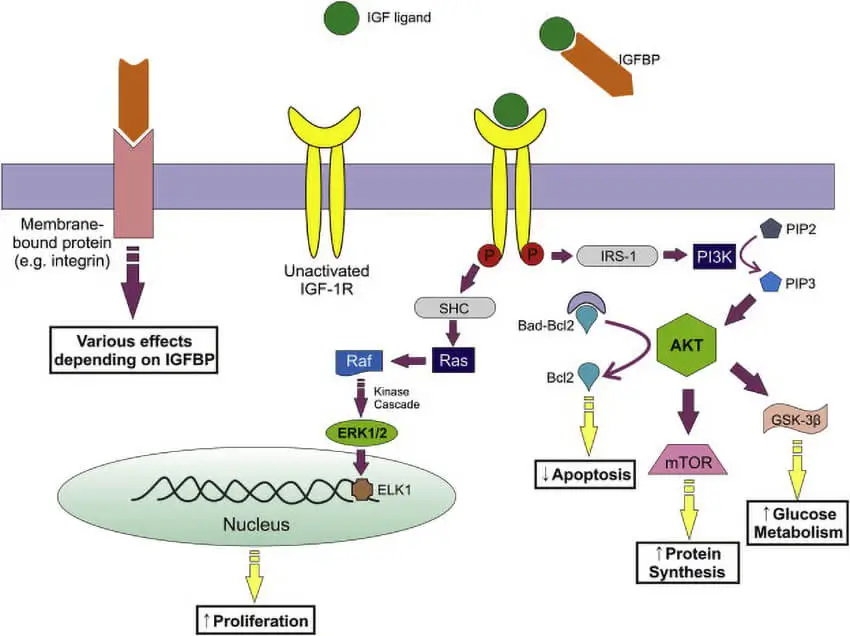
It starts pumping IGF-1. In the fasting state liver, GH (growth hormone) binding is decreased, so more of the GH is left in the bloodstream. In protein restriction, GH receptors are maintained but not for IGF-1.
To avoid loss of muscle during calorie restriction and dieting and to increase the benefit of calorie restriction the way to go is to do moderate resistance training. This will not prevent muscle loss but will be beneficial to some extent (Cava et al., 2017).
Another way is to avoid non-vegan food or in other words sources of “complete” protein in high amounts.
When we ingest an incomplete source of protein, meaning it lacks some of the essential amino acids, it will not signal the IGF-1 release at the same level. It is not just about the overall amount of protein consumed but also the source (Allen et al., 2002).
If you are vegan and you eat complete sources of protein like soy, you will negate the benefit. It is because of the protein profile. Vegans for instance that eat 7 to 18 servings of soy meals a day may end up with circulating IGF-1 levels that are relative to those who eat meat. That is because soy has complete protein. Some other plants have high-quality proteins too. The high consumption level of protein in the diet has other negative effects regardless. Also if your only goal is to prevent muscle mass loss during dieting and are not interested in longevity you will want to increase your protein intake.
The good news is that we can use autophagy to clean our genetic base, the bad news is that we do not do it anymore. In the past nature forced us by not providing enough resources. Today we eat regularly and even if we go hungry that will not last enough to deplete our glycogen stores.
References:
- Fernández-Ruiz I. (2017). Metabolism: Calorie restriction for healthy ageing. Nature reviews. Cardiology, 14(4), 190. https://doi.org/10.1038/nrcardio.2017.26
- Cava, E., Yeat, N. C., & Mittendorfer, B. (2017). Preserving Healthy Muscle during Weight Loss. Advances in Nutrition, 8(3), 511-519. https://doi.org/10.3945/an.116.014506
- Allen, N. E., Appleby, P. N., Davey, G. K., Kaaks, R., Rinaldi, S., & Key, T. J. (2002). The associations of diet with serum insulin-like growth factor I and its main binding proteins in 292 women meat-eaters, vegetarians, and vegans. Cancer epidemiology, biomarkers & prevention : a publication of the American Association for Cancer Research, cosponsored by the American Society of Preventive Oncology, 11(11), 1441–1448.[PubMed]
- Welton, S., Minty, R., O’Driscoll, T., Willms, H., Poirier, D., Madden, S., & Kelly, L. (2020). Intermittent fasting and weight loss: Systematic review. Canadian family physician Medecin de famille canadien, 66(2), 117–125.[PubMed]
- Zouhal, H., Saeidi, A., Salhi, A., Li, H., Essop, M. F., Laher, I., Rhibi, F., Amani-Shalamzari, S., & Ben Abderrahman, A. (2020). Exercise Training and Fasting: Current Insights. Open access journal of sports medicine, 11, 1–28. https://doi.org/10.2147/OAJSM.S224919
- Denduluri, S. K., Idowu, O., Wang, Z., Liao, Z., Yan, Z., Mohammed, M. K., Ye, J., Wei, Q., Wang, J., Zhao, L., & Luu, H. H. (2015). Insulin-like growth factor (IGF) signaling in tumorigenesis and the development of cancer drug resistance. Genes & diseases, 2(1), 13–25. https://doi.org/10.1016/j.gendis.2014.10.004
Related Posts
Do you have any questions about nutrition and health?
I would love to hear from you and answer them in my next post. I appreciate your input and opinion and I look forward to hearing from you soon. I also invite you to follow us on Facebook, Instagram, and Pinterest for more diet, nutrition, and health content. You can leave a comment there and connect with other health enthusiasts, share your tips and experiences, and get support and encouragement from our team and community.
I hope that this post was informative and enjoyable for you and that you are prepared to apply the insights you learned. If you found this post helpful, please share it with your friends and family who might also benefit from it. You never know who might need some guidance and support on their health journey.
– You Might Also Like –

Learn About Nutrition
Milos Pokimica is a doctor of natural medicine, clinical nutritionist, medical health and nutrition writer, and nutritional science advisor. Author of the book series Go Vegan? Review of Science, he also operates the natural health website GoVeganWay.com
Medical Disclaimer
GoVeganWay.com brings you reviews of the latest nutrition and health-related research. The information provided represents the personal opinion of the author and is not intended nor implied to be a substitute for professional medical advice, diagnosis, or treatment. The information provided is for informational purposes only and is not intended to serve as a substitute for the consultation, diagnosis, and/or medical treatment of a qualified physician or healthcare provider.NEVER DISREGARD PROFESSIONAL MEDICAL ADVICE OR DELAY SEEKING MEDICAL TREATMENT BECAUSE OF SOMETHING YOU HAVE READ ON OR ACCESSED THROUGH GoVeganWay.com
NEVER APPLY ANY LIFESTYLE CHANGES OR ANY CHANGES AT ALL AS A CONSEQUENCE OF SOMETHING YOU HAVE READ IN GoVeganWay.com BEFORE CONSULTING LICENCED MEDICAL PRACTITIONER.
In the event of a medical emergency, call a doctor or 911 immediately. GoVeganWay.com does not recommend or endorse any specific groups, organizations, tests, physicians, products, procedures, opinions, or other information that may be mentioned inside.
Editor Picks –
Milos Pokimica is a health and nutrition writer and nutritional science advisor. Author of the book series Go Vegan? Review of Science, he also operates the natural health website GoVeganWay.com
Latest Articles –
Top Health News — ScienceDaily
- The overlooked nutrition risk of Ozempic and Wegovyon February 4, 2026
Popular weight-loss drugs like Ozempic and Wegovy can dramatically curb appetite, but experts warn many users are flying blind when it comes to nutrition. New research suggests people taking these medications may not be getting enough guidance on protein, vitamins, and overall diet quality, increasing the risk of muscle loss and nutrient deficiencies.
- A 25-year study found an unexpected link between cheese and dementiaon February 4, 2026
A massive Swedish study tracking nearly 28,000 people for 25 years found an unexpected link between full-fat dairy and brain health. Among adults without a genetic risk for Alzheimer’s, eating more full-fat cheese was associated with a noticeably lower risk of developing the disease, while higher cream intake was tied to reduced dementia risk overall. The findings challenge decades of low-fat dietary advice but come with important caveats.
- MIT’s new brain tool could finally explain consciousnesson February 4, 2026
Scientists still don’t know how the brain turns physical activity into thoughts, feelings, and awareness—but a powerful new tool may help crack the mystery. Researchers at MIT are exploring transcranial focused ultrasound, a noninvasive technology that can precisely stimulate deep regions of the brain that were previously off-limits. In a new “roadmap” paper, they explain how this method could finally let scientists test cause-and-effect in consciousness research, not just observe […]
- Why heart disease risk in type 2 diabetes looks different for men and womenon February 4, 2026
Scientists are digging into why heart disease risk in type 2 diabetes differs between men and women—and sex hormones may be part of the story. In a large Johns Hopkins study, men with higher testosterone had lower heart disease risk, while rising estradiol levels were linked to higher risk. These hormone effects were not seen in women. The results point toward more personalized approaches to heart disease prevention in diabetes.
- Sound machines might be making your sleep worseon February 4, 2026
Sound machines may not be the sleep saviors many believe. Researchers found that pink noise significantly reduced REM sleep, while simple earplugs did a better job protecting deep, restorative sleep from traffic noise. When pink noise was combined with outside noise, sleep quality dropped even further. The results suggest that popular “sleep sounds” could be doing more harm than good—particularly for kids.
- This unexpected plant discovery could change how drugs are madeon February 3, 2026
Plants make chemical weapons to protect themselves, and many of these compounds have become vital to human medicine. Researchers found that one powerful plant chemical is produced using a gene that looks surprisingly bacterial. This suggests plants reuse microbial tools to invent new chemistry. The insight could help scientists discover new drugs and produce them more sustainably.
- A hidden cellular process may drive aging and diseaseon February 3, 2026
As we age, our cells don’t just wear down—they reorganize. Researchers found that cells actively remodel a key structure called the endoplasmic reticulum, reducing protein-producing regions while preserving fat-related ones. This process, driven by ER-phagy, is tied to lifespan and healthy aging. Because these changes happen early, they could help trigger later disease—or offer a chance to stop it.
PubMed, #vegan-diet –
- Diet type and the oral microbiomeon February 2, 2026
CONCLUSION: The diet-oral microbiome-systemic inflammation axis is bidirectional and clinically relevant. Understanding both direct ecological regulation and indirect metabolic effects is essential to support precision nutrition strategies aimed at maintaining oral microbial balance and systemic inflammatory risk mitigation.
- Consensus document on healthy lifestyleson January 22, 2026
Proteins are a group of macronutrients that are vital to our lives, as they perform various functions, including structural, defensive and catalytic. An intake of 1.0-1.2 g/kg/body weight per day would be sufficient to meet our needs. Carbohydrate requirements constitute 50 % of the total caloric value and should be obtained mainly in the form of complex carbohydrates. In addition, a daily intake of both soluble and insoluble fiber is necessary. Regular consumption of extra virgin olive oil […]
- Vitamin B12 and D status in long-term vegetarians: Impact of diet duration and subtypes in Beijing, Chinaon January 21, 2026
CONCLUSIONS: This study reveals a dual challenge among Beijing long-term vegetarians: vitamin B12 deficiency was strongly associated with the degree of exclusion of animal products from the diet (veganism), while vitamin D deficiency was highly prevalent and worsened with longer diet duration. The near-universal vitamin D deficiency observed in this study suggests that, in the Beijing context, the risk may extend beyond dietary choice, potentially reflecting regional environmental factors;…
- Nutritional evaluation of duty meals provided to riot police forces in Germanyon January 13, 2026
Background: The primary role of the German riot police is maintaining internal security. Due to challenging working conditions, riot police forces face an elevated risk of various diseases. During duty, forces are provided with meals. A balanced diet can reduce the risk of some of these diseases and contribute to health-promoting working conditions. Aim: First evaluation of the nutritional quality of duty meals in Germany based on German Nutrition Society recommendations (DGE). Methods: In…
- Iodineon January 1, 2006
Iodine is an essential trace nutrient for all infants that is a normal component of breastmilk. Infant requirements are estimated to be 15 mcg/kg daily in full-term infants and 30 mcg/kg daily in preterm infants.[1] Breastmilk iodine concentration correlates well with maternal urinary iodine concentration and may be a useful index of iodine sufficiency in infants under 2 years of age, but there is no clear agreement on a value that indicates iodine sufficiency, and may not correlate with […]
Random Posts –
Featured Posts –
Latest from PubMed, #plant-based diet –
- From paddy soil to dining table: biological biofortification of rice with zincby Lei Huang on February 4, 2026
One-third of paddy soils are globally deficient in zinc (Zn) and 40% of Zn loss in the procession from brown rice to polished rice, which results in the global issue of hidden hunger, e.g., the micronutrient deficiencies in the rice-based population of developing countries. In the recent decades, biofortification of cereal food crops with Zn has emerged as a promising solution. Herein, we comprehensively reviewed the entire process of Zn in paddy soil to human diet, including the regulatory…
- Molecular Characterization of Tobacco Necrosis Virus A Variants Identified in Sugarbeet Rootsby Alyssa Flobinus on February 3, 2026
Sugarbeet provides an important source of sucrose; a stable, environmentally safe, and low-cost staple in the human diet. Viral diseases arising in sugarbeet ultimately impact sugar content, which translates to financial losses for growers. To manage diseases and prevent such losses from occurring, it is essential to characterize viruses responsible for disease. Recently, our laboratory identified a tobacco necrosis virus A variant named Beta vulgaris alphanecrovirus 1 (BvANV-1) in sugarbeet…
- Nutrition in early life interacts with genetic risk to influence preadult behaviour in the Raine Studyby Lars Meinertz Byg on February 3, 2026
CONCLUSIONS: Nutrition in early life and psychiatric genetic risk may interact to determine lasting child behaviour. Contrary to our hypothesis, we find dietary benefits in individuals with lower ADHD PGS, necessitating replication. We also highlight the possibility of including genetics in early nutrition intervention trials for causal inference.
- Effect of the gut microbiota on insect reproduction: mechanisms and biotechnological prospectsby Dilawar Abbas on February 2, 2026
The insect gut microbiota functions as a multifunctional symbiotic system that plays a central role in host reproduction. Through the production of bioactive metabolites, gut microbes interact with host hormonal pathways, immune signaling, and molecular regulatory networks, thereby shaping reproductive physiology and fitness. This review summarizes recent advances in understanding how gut microbiota regulate insect reproduction. Accumulating evidence demonstrates that microbial metabolites…
- Rationale and design of a parallel randomised trial of a plant-based intensive lifestyle intervention for diabetes remission: The REmission of diabetes using a PlAnt-based weight loss InteRvention…by Brighid McKay on February 2, 2026
CONCLUSIONS: This trial will provide high-quality clinical evidence on the use of plant-based ILIs to address the epidemics of obesity and diabetes to inform public health policies and programs in Canada and beyond.
- Diet type and the oral microbiomeby Daniel Betancur on February 2, 2026
CONCLUSION: The diet-oral microbiome-systemic inflammation axis is bidirectional and clinically relevant. Understanding both direct ecological regulation and indirect metabolic effects is essential to support precision nutrition strategies aimed at maintaining oral microbial balance and systemic inflammatory risk mitigation.
